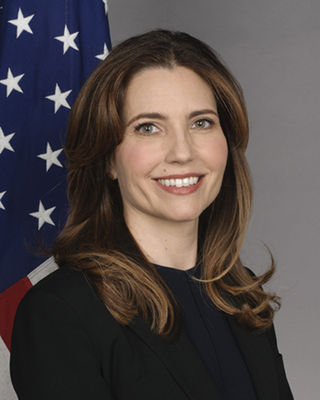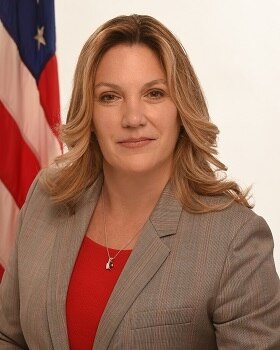
The Cabinet of the United States is a body consisting of the vice president of the United States and the heads of the executive branch's departments in the federal government of the United States. It is the principal official advisory body to the president of the United States. The president chairs the meetings but is not formally a member of the Cabinet. The heads of departments, appointed by the president and confirmed by the Senate, are members of the Cabinet, and acting department heads also participate in Cabinet meetings whether or not they have been officially nominated for Senate confirmation. The president may designate heads of other agencies and non-Senate-confirmed members of the Executive Office of the President as members of the Cabinet.

The United States National Security Council (NSC) is the principal forum used by the president of the United States for consideration of national security, military, and foreign policy matters. Based in the White House, it is part of the Executive Office of the President of the United States, and composed of senior national security advisors and Cabinet officials.
The United States order of precedence is an advisory document maintained by the Ceremonials Division of the Office of the Chief of Protocol of the United States which lists the ceremonial order, or relative preeminence, for domestic and foreign government officials at diplomatic, ceremonial, and social events within the United States and abroad. The list is used to mitigate miscommunication and embarrassment in diplomacy, and offer a distinct and concrete spectrum of preeminence for ceremonies. Often the document is used to advise diplomatic and ceremonial event planners on seating charts and order of introduction. Former presidents, vice presidents, first ladies, second ladies, and secretaries of state and retired Supreme Court justices are also included in the list.

The White House Fellows program is a non-partisan federal fellowship established via executive order by President Lyndon B. Johnson in October 1964. The fellowship is one of America’s most prestigious programs for leadership and public service, offering exceptional Americans first-hand experience working at the highest levels of the federal government. The fellowship was founded based upon a suggestion from John W. Gardner, then the president of Carnegie Corporation and later the sixth secretary of health, education, and welfare.
The Cabinet of Australia, officially the Cabinet of the Commonwealth of Australia, also known as the Federal Cabinet, is the chief decision-making body of the executive branch of the federal government of Australia. The cabinet is appointed by the prime minister of Australia and is composed of senior government ministers who head the executive departments and ministries of the federal government, this often includes assistant ministers and a number of special envoys and other government advisors. The cabinet is separate to the federal Department of the Prime Ministers and Cabinet.

The Privy Council Office is the central agency of the Government of Canada which acts as the secretariat to the Cabinet of Canada – a committee of the King's Privy Council for Canada – and provides non-partisan advice and support to the Canadian ministry, as well as leadership, coordination, and support to the departments and agencies of government.

Patrick Francis Kennedy is a former career Foreign Service Officer who served as the U.S. State Department's Under Secretary of State for Management. He was Director of the Office of Management Policy, Rightsizing and Innovation. He has been Deputy Director for Management at the cabinet level Office of the Director of National Intelligence; he returned to the Department of State on May 7, 2007. Kennedy was U.S. Ambassador to the United Nations for Management and Reform and previously served as Chief of Staff for the Coalition Provisional Authority in Iraq. He was the Assistant Secretary of State for Administration for the Clinton Administration from 1993 to 2001. In 2014, Kennedy was elected as a fellow of the National Academy of Public Administration.

Melanne Verveer is the executive director of the Georgetown Institute for Women, Peace and Security at Georgetown University. She is a founding partner of Seneca Point Global, a worldwide women strategy firm, and a co-founder of Seneca Women. Melanne Verveer co-authored the book Fast Forward: How Women Can Achieve Power and Purpose with Kim Azzarelli.

Maria Echaveste is a former U.S. presidential advisor to Bill Clinton and White House Deputy Chief of Staff during the second Clinton administration. She is one of the highest-ranking Latinas to have served in a presidential administration. She is currently a Senior Fellow at the Center for American Progress and a co-founder of the Nueva Vista Group, a policy, legislative strategy and advocacy group working with non-profit and corporate clients.

Evelyn May Lieberman was an American public affairs professional who, during the Clinton administration, became the first woman to serve as White House Deputy Chief of Staff, and was the first United States Under Secretary of State for Public Diplomacy and Public Affairs.

The White House Office is an entity within the Executive Office of the President of the United States (EOP). The White House Office is headed by the White House chief of staff, who is also the head of the Executive Office of the President. The staff work for and report directly to the president, including West Wing staff and the president's senior advisers. Almost all of the White House Office staff are political appointees of the president, do not require Senate confirmation and can be dismissed at the discretion of the president. Aside from Cabinet secretaries and Supreme Court justices, whose nominations require the approval of the Senate, the president of the United States has the authority to appoint people to high-level positions within the federal government unilaterally.
The cabinet of former New York Governor Eliot Spitzer consisted of his Executive Chamber, as well as the heads of the various departments of the Government of New York.
The cabinet of Governor of New York David Paterson consists of the executive chamber, and the heads of the various departments of the Government of New York. On Paterson's first day as governor, he asked for letters of resignation from all of the top staff members and state agency commissioners appointed by previous Governor Eliot Spitzer. This typical action does not mean the holdovers from the Spitzer administration will be replaced, and Paterson said that "having the letters gives him the flexibility to make changes if he decides to".

Alicia Haydock Munnell is an American economist who is the Peter F. Drucker Professor of Management Sciences at Boston College's Carroll School of Management. Educated at Wellesley College, Boston University, and Harvard University, Munnell spent 20 years as an economist at the Federal Reserve Bank of Boston, where she researched wealth, savings, and retirement among American workers. She served in the Bill Clinton administration as Assistant Secretary of the Treasury for Economic Policy and as a member of the Council of Economic Advisers. Since 1997 she has been a professor at Boston College and director of its Center for Retirement Research, where she writes on retirement income policy.

Barack Obama assumed office as President of the United States on January 20, 2009, and his term ended on January 20, 2017. The president has the authority to nominate members of his Cabinet to the United States Senate for confirmation under the Appointments Clause of the United States Constitution.

Evan Maureen Ryan is an American public servant serving as White House cabinet secretary in the administration of Joe Biden. She previously served as assistant secretary of state for educational and cultural affairs (ECA) in the Obama administration (2013–2017) and was assistant for intergovernmental affairs and public liaison for then-Vice President Joe Biden.
The following is a timeline of the presidency of Bill Clinton from his inauguration as the 42nd president of the United States on January 20, 1993, to December 31, 1993.

Andrea Joan Palm is an American government health advisor who is the United States Deputy Secretary of Health and Human Services in the Biden administration. Previously, Palm served as secretary-designee of the Wisconsin Department of Health Services from 2019 to 2021 in the administration of Governor Tony Evers, an office she was never sworn into due to Republican opposition in the Wisconsin Senate.

Lee Satterfield is an American diplomat who has served as Assistant Secretary of State for Educational and Cultural Affairs in the Biden administration since November 2021.














